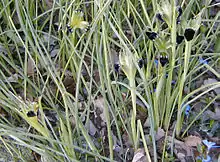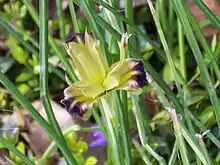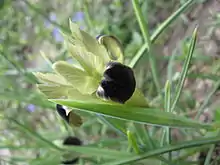Iris tuberosa
Iris tuberosa (formerly Hermodactylus tuberosus) is a species of non-rhizomatous plant of the genus Iris, with the common names snake's-head,[2] snake's-head iris,[3] widow iris, black iris, or velvet flower-de-luce.
| Iris tuberosa | |
|---|---|
 | |
| Scientific classification | |
| Kingdom: | Plantae |
| Clade: | Tracheophytes |
| Clade: | Angiosperms |
| Clade: | Monocots |
| Order: | Asparagales |
| Family: | Iridaceae |
| Genus: | Iris |
| Subgenus: | Iris subg. Hermodactyloides |
| Section: | Iris sect. Reticulatae |
| Species: | I. tuberosa |
| Binomial name | |
| Iris tuberosa | |
| Synonyms[1] | |
| |


Distribution
A native of the Mediterranean region, it is found in the northern Mediterranean littoral and western Europe.[4]
Cultivation
It is grown from tuberous bulbs planted in the autumn. It grows best in full sun to partial shade, and requires well-drained soil. It can naturalise in grassy areas but grows well in rock gardens or containers.[5] It is a common ornamental garden plant, flowering in early spring. It is rather tender in the UK.[6]
Taxonomic history
After being split off from the genus Iris in the nineteenth century into a separate genus,[7] Hermodactylus, it has most recently been returned to the genus Iris,[8][9] following molecular studies at Kew.[10] According to the proposed molecular classification of irises of Tillie, Chase and Hall,[10] this species is now best seen as a member of the subgenus Hermodactyloides, the reticulate-bulbed bulbous irises.
References
- GBIF: Hermodactylus tuberosus
- Thomas Ignatius M. Forster (1828)Circle of the seasons, and perpetual key to the calendar and almanack, p. 162, at Google Books
- "BSBI List 2007". Botanical Society of Britain and Ireland. Archived from the original (xls) on 2015-01-25. Retrieved 2014-10-17.
- Schede di botanica : Hermodactylus tuberosus (L.) Salisb.
- Paghat's Garden Paghat's Garden: Snake's-head or Widow Iris
- Caledonian Horticultural Society, Edinburgh Memoirs, Volume 3 (1823), p. 251, at Google Books
- David Joyce: The Genus Iris
- Pacific Bulb Society
- "Is It Clear, My Friend?". Royal Botanic Gardens, Kew: World Checklist of Selected Plant Families. Retrieved 3 Sep 2011.
- Tillie N, Chase MW, Hall T. 2002 Molecular studies in the genus Iris L.: a preliminary study. Ann. Bot. n.s. (Italy) 1. (2): 105-112 (2001)
Bibliography
- Telegraph: How to grow Hermodactylus
- Manning, John; Goldblatt, Peter (2008). The Iris Family: Natural History & Classification. Portland, Oregon: Timber Press. pp. 204–207. ISBN 978-0-88192-897-6.
- Goldblatt, P., (1990) Phylogeny and classification of Iridaceae. Ann. Missouri Bot. Gard. 77:607-627.
- Reeves, G., Chase, M.W., Goldblatt, P., Rudall, P., Fay, M.F., Cox, A.V., LeJeune, B., & Souza-Chies, T., (2001). Molecular systematics of Iridaceae: Evidence from four plastid DNA regions. Am. J. Bot. 88:2074-2087.
- Iridaceae: in L. Watson and M.J. Dallwitz (1992 onwards). The families of flowering plants: descriptions, illustrations, identification, information retrieval
| Wikimedia Commons has media related to Iris tuberosa. |
| Wikispecies has information related to Iris tuberosa. |